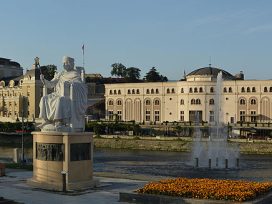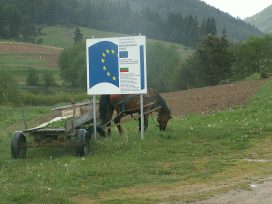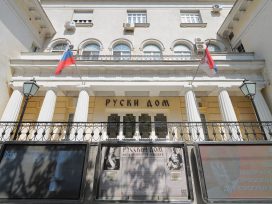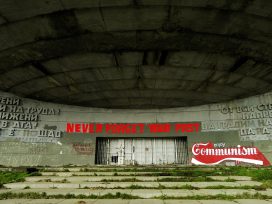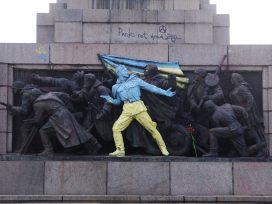The Balkans continue to haunt the European Union (EU). In the 1990s, still under the shock of the disintegration of Yugoslavia, the EU declared that ‘the hour of Europe’ had come. This turned out to be a foolhardy assertion. It was only American intervention, formalised in the Dayton Accords of 1995, which established the present configuration of Bosnia-Herzegovina, and NATO intervention in Kosovo in 1999, again under the auspices of the United States, that put an end to the military phase of the Yugoslav crisis.
The Yugoslav experience confirmed the European Union in its deepest belief: there was no salvation outside the EU. If the ex-Yugoslav states had been in the EU, the dismemberment of Yugoslavia would have occurred without bloodshed, it was said in Brussels. Thus, it was only by integrating new members that there would be a zone of peace and stability in Europe. This was the philosophy that underwrote the eastward expansion of the EU. Five ex-communist states (Poland, The Czech Republic, Slovakia, Hungary, Slovenia) as well as three Baltic countries (Lithuania, Latvia, Estonia) which had been part of the Soviet Union for almost fifty years, were admitted to the EU in 2004. Two Balkan countries, Romania and Bulgaria, followed in 2007. Finally, Croatia, an ex-Yugoslav republic like Slovenia, joined in 2013.
Even during this process Brussels experienced disillusionment. In 2004 the EU threatened not to admit Cyprus as long as the island had not overcome the thirty-year old territorial division between its Greek and Turkish populations. The Annan Plan offered a route to re-unification of the island in order to satisfy one of the strictest criteria of the EU: no admission without resolution of internal problems and problems with one’s neighbours. But the Annan Plan was rejected in a referendum and Cyprus, still divided, was admitted into the EU. After this first disappointment, the EU discovered that countries which had faithfully fulfilled the conditions imposed upon them during the admission process, were quick to violate them once admitted. This was the case for Latvian and Estonian policies towards their Russian minorities, an issue in which the EU had been deeply involved before admitting the Baltic states and one in which it had, wrongly, believed it could count on the co-operation and understanding of the countries concerned. Once admitted into the union, the number of naturalizations in these countries, the principal indicator of minority integration, fell drastically. Other disappointments came later. Today, Hungary and Poland make a mockery of European norms and values, even as they profit from the EU’s generous subsidies. Romania and Bulgaria continue to struggle with significant poverty and corruption a decade after their admission into the EU.
Moreover, the EU has undergone seismic shocks in the West: an alarming rise in populism and generalized euro-scepticism, most evident in Brexit, the British decision in 2016 to leave the EU. At the same time, crises on the periphery of the EU have multiplied. A resurgent Russia, notably in Ukraine, and a newly active Turkey, in the Middle East and the Balkans, have not hidden their diplomatic ambitions in regions where they enjoy historical roots and contemporary support. The leading state in the EU and the one most concerned by the Balkans, Germany, has decided that it needs to reiterate the EU’s commitment to admission of the six states of the Western Balkans: Serbia, Albania, Macedonia, Montenegro, Bosnia-Herzegovina, and Kosovo.
This is the origin of the ‘Berlin process’ which has been organizing annual meetings since 2014, most recently on 12 July 2017 in Trieste. These meetings have brought together the countries of the Western Balkans, including the two who are already members of the EU, Slovenia and Croatia, as well as several other EU members, most notably Germany and those who have hosted meetings in 2015, 2016, 2017: Austria, France and Italy. In Trieste, France’s President Emmanuel Macron and Germany’s Chancellor Angela Merkel took the floor, underscoring the importance of the event.
But the Berlin process implies a squaring of the circle. Four Western Balkan countries are officially EU candidates (Serbia, Montenegro, Albania and Macedonia). Two others (Kosovo and Bosnia-Herzegovina) are ‘potential candidates’. All the countries of the region, including the potential candidates, have concluded stabilization and association agreements with the EU, normally an important step towards admission. Enthusiasm for the EU is strong throughout the region, frustrating efforts by Russia, which is keen to increase its influence but is unable to offer any attractive alternative to EU membership. Some governments, notably those of Serbia and Albania, have even set the dates by which they expect to join the EU: 2020 and 2022, respectively.
Yet, at the same time, the EU is suffering from ‘enlargement fatigue.’ Even if Brussels were not reluctant, it is most improbable that all 27 EU members would agree to include all – or even any – of the West Balkans states, as is required by the EU’s statutes. Moreover, wiser through experience, Brussels is now well aware that the internal problems of the Balkans will not disappear with integration into the EU. The conflict between Republika Srpska and the other component of Bosnia-Herzegovina, the Bosniak-Croat Federation, which has paralyzed the functioning of the state, would persist. Kosovo is not recognized by five current members of the EU (Spain, Slovakia, Romania, Greece and Cyprus), largely because of their own minority problems and the dangerous separatist precedent that Kosovo represents. Greece is blocking Macedonian moves towards the EU, refusing to accept the name that Macedonia has given itself under the pretext that it reflects an irredentist claim on northern Greece, while Bulgaria does not recognise the existence of a Macedonian nation, claiming that Macedonians are, in fact, Bulgarians. Albania has managed to maintain its territorial integrity, in spite of the economic crisis that led to civil conflict there in the 1990s. At present, Albania is confronted with the prospect of unifying all Albanian-speakers in the peninsula. This is a proposition expressly forbidden by the international community, but which is gaining support in Albania, Kosovo and among the Albanians of Macedonia.
In the face of these problems, EU members’ reiterations of their commitment to the European future of the Western Balkans, as they do at every meeting of the Berlin Process, most recently in Trieste, ring hollow. Everyone has in mind the example of Turkey, which submitted its application 30 years ago and which has been recognized by the EU as a full-fledged candidate for almost 20 years. It is still not a member, and the prospect of it becoming so grows ever weaker. Moreover, the closing of the Balkan route for refugees coming from Asia, following an agreement between Turkey and the EU, means that the Western Balkans have lost an opportunity to show their European zeal by closing their borders and have lost a powerful lever with which to influence Brussels.
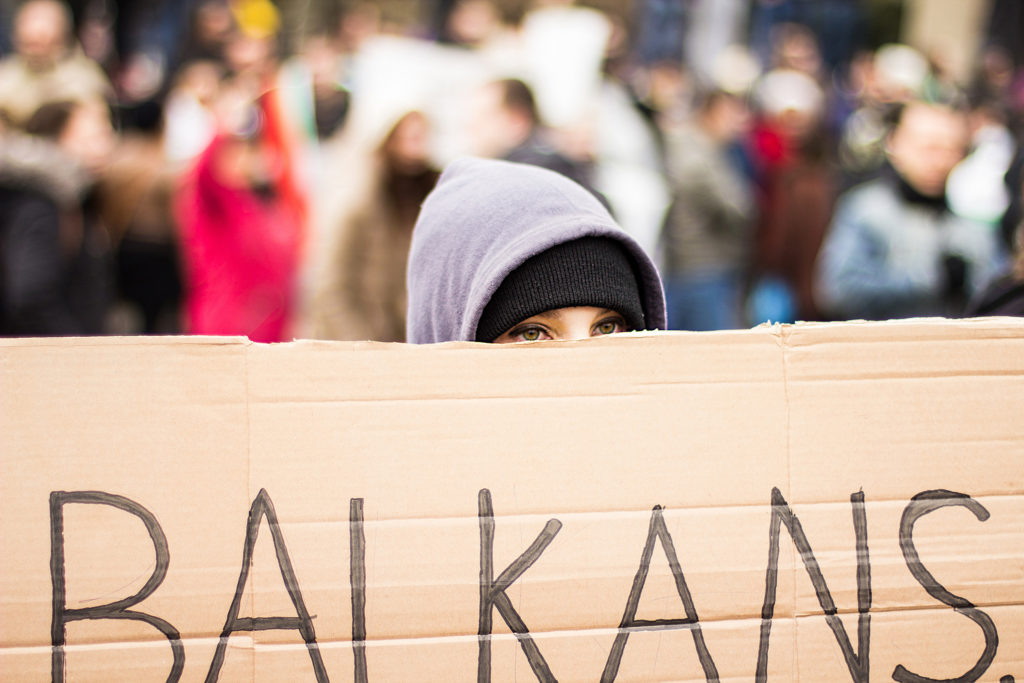
Photo: George Chelebiev. Source: Flickr
To compensate for the fact that the Western Balkans will not see the promises of admission realized in the near future, Western powers have multiplied their offers to fund regional projects. In Trieste this year, as in Paris last year, and Vienna and Berlin before that, one hears of grandiose infrastructure projects, for example a railway link among several states. One hears of a Balkan customs union, and the Balkan states solemnly commit themselves to disregard their bilateral quarrels. The beneficiary states accept the gifts they are offered but continue to insist that promises of membership in the EU, promises made at another time and in other circumstances, be respected.
The EU is embarrassed. The states of the Western Balkans remain frustrated. But there seems little prospect of this now semi-permanent deadlock being broken.
